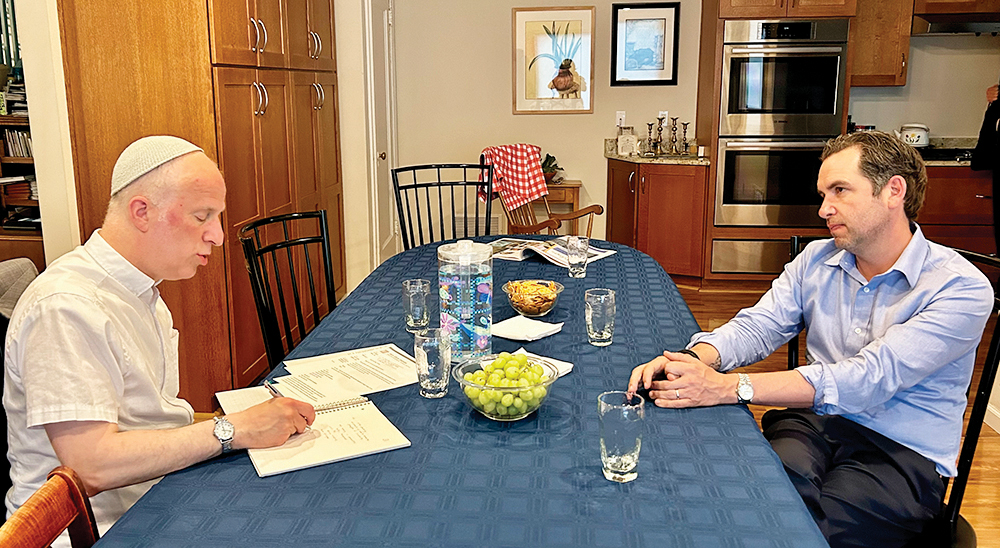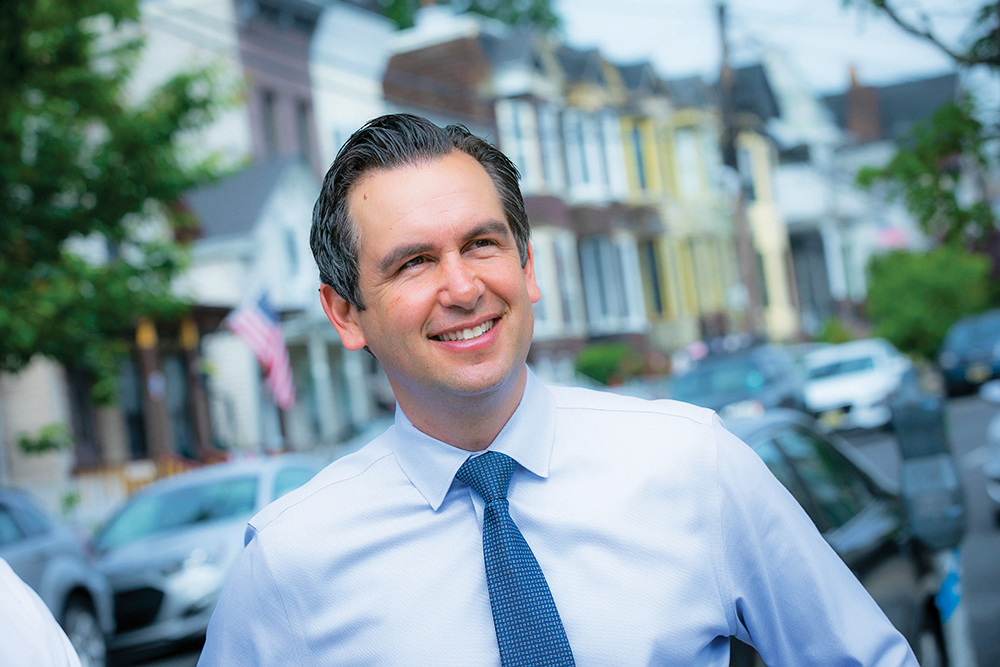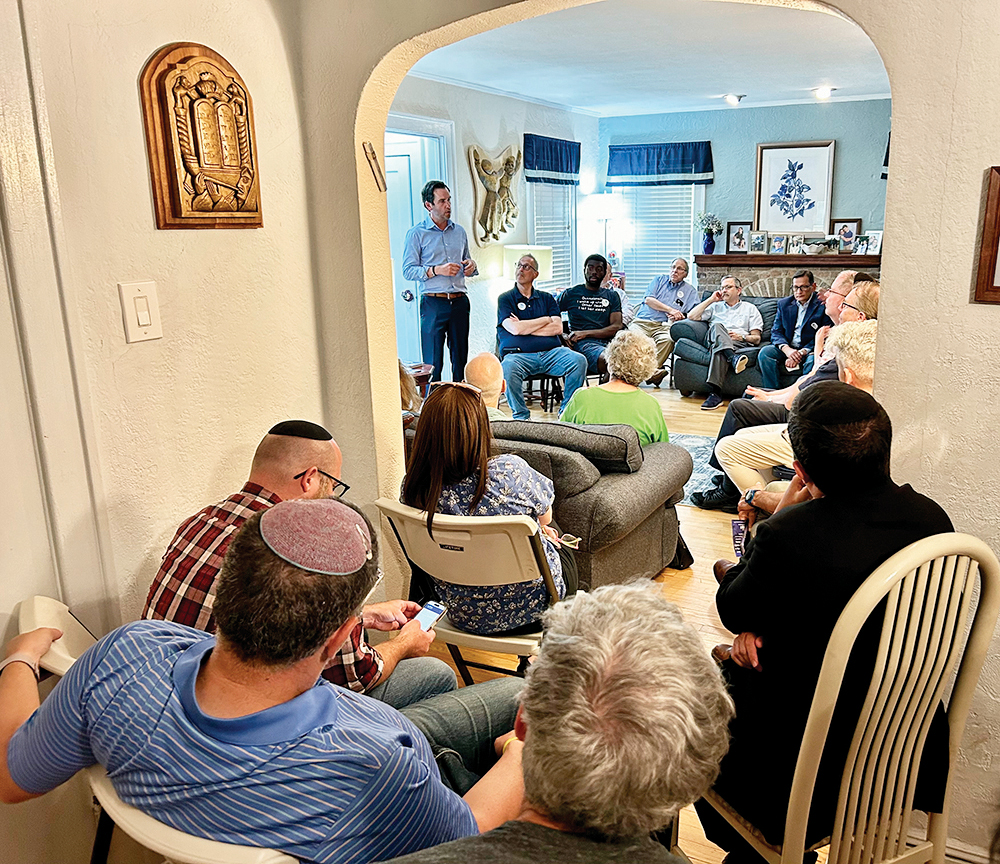
This story inaugurates a new series of articles in The Jewish Link, in which the leading candidates running for governor of the State of New Jersey, to be elected in November 2025, will be profiled. Though the 2025 New Jersey Gubernatorial Election is 16 months away, the Democratic and Republican primary elections are less than a year away.
This first installment focuses on Jersey City Mayor Steven Fulop.
According to the Fulop for Governor website: “Steven grew up in a Jewish family in Edison, New Jersey, the son of Romanian immigrants. His mother was the daughter of Holocaust survivors and worked in an immigration services office helping others gain citizenship. His father owned a delicatessen in Newark, where Steven worked behind the counter as a teenager.
“Steven graduated from Binghamton University in 1999 and spent time abroad studying at Oxford University in the UK. After college, he joined Goldman Sachs, the investment banking firm, working in Chicago and later in Manhattan and Jersey City. On the morning of September 11, 2001, Steven was working in lower Manhattan when he saw the first plane strike the Twin Towers. A few weeks later, he decided to put his career at Goldman Sachs on hold and join the United States Marine Corps.
“Steven’s Reserve Unit deployed to Iraq in January 2003. … In 2006, Steven completed his service to the Marine Corps Reserve with the rank of Corporal.
“After his service in Iraq, Steven returned to Goldman Sachs, leaving in early 2006 to take a position at Sanford C. Bernstein & Co. … Steven first tried his hand at politics by running for Congress in 2004. He lost. The next year, Steven ran for the Jersey City Council, and won. He served as a councilman for eight years before becoming Mayor.”

In May 2013 Fulop was elected Mayor of Jersey City. He is currently serving in his third term as mayor.
According to the website: “Under his leadership, Jersey City became the first city in New Jersey—and the sixth city in the United States—to ensure paid sick leave. Mayor Steven Fulop has led the city to record economic development, benefiting families of all income levels—all without raising taxes.
“He’s pioneered new ideas for helping prisoners re-enter society, passed legislation to protect small businesses, encouraged more businesses to open shop, made Jersey City one of the greenest towns in the nation and he’s undertaken sweeping public safety reform with the JCPD, now seen as a model for diversity across the nation.”
On July 10 The Jewish Link sat down with Fulop to ask him questions relevant to our readers. His answers (edited for clarity and space constraints) follow.
What inspires you to run for governor of New Jersey? Why do you believe you are the most qualified candidate to take this position?
I believe strongly in public service. I come from a family of immigrants who are Holocaust survivors, who came here to pursue the American Dream, so this motivates me a great deal.
I am uniquely qualified for the role of governor due to my experience as the top executive of a city that is recognized as the most diverse city in New Jersey and one of the most diverse in the United States. As the top executive, you deal with the city’s challenges in a hands-on, accountable sort of way. That experience uniquely qualifies me. I am driven to leave New Jersey in a better place for my kids than I found it.
What is your leadership style?
I like to be very involved and I’m detail-oriented. I surround myself with good people who are smarter than me. This style has worked well for me as mayor over the past 10 years. I find that I must be engaged in the challenges we face.
What three to four accomplishments in your role as mayor of Jersey City are you most proud of?
Eleven years ago, Jersey City was a far different place. There was a big corruption scandal involving Solomon Dweck that reached into City Hall. We have restored trust in government and accountability. More people are moving into town. We have reformed the housing process and increased affordable housing.
I’m also proud that Jersey City has served as a laboratory of change and an example for the New Jersey State. Many recent policy changes in New Jersey started in Jersey City, such as increased minimum wage, paid sick leave, decriminalization of marijuana, affordable housing overlay zones, and direct hires in state government.
In your view, what are the three biggest problems facing the State of New Jersey at this time?
One big issue is affordability, both in taxes and housing and other areas.
Transportation costs and funding are another pressing issue. We need to increase our investment in public transportation. I encourage people to see the detailed proposal on my website.
We also need government reform. I’m thinking of things like the county line on the ballot, conflict of interests by legislators and government officials, who has access to elections, and term limits. These sorts of things add to the cost of government, which is an added tax to residents.
Can you suggest new tactics to fight the rising tide of antisemitism in New Jersey?
I have direct experience in a very real way. In December 2019 we experienced a mass shooting in a kosher grocery store in Jersey City. We noticed afterwards that there was a chasm between the observant Jewish community and the rest of the community. We spent a lot of time working on education, and dialogue between community leaders. These were good steps to bridge the gap between community leaders.

Legislation, in my view, is not the appropriate answer. No legislation can be all-encompassing of every sort of circumstance. You can’t legislate away hatred; education is really the best approach.
I would add that no other mayor in New Jersey has more experience in elevating Israel and embracing Israeli innovations and technology in government. We have been building Sci-Tech City, which is a partnership between the Liberty Science Center and Sheba Medical Center. We are elevating Israeli contributions, which is another way to address antisemitism.
How would you handle the anti-Israel/antisemitic rallies, which often exhibit harassing behaviors, on college campuses and in high schools?
The values of freedom of speech and freedom of expression are very important, especially to leaders in higher education. But they must be done in a peaceful way and in a way that does not violate other people’s rights. In some places, like Columbia, it ventured in an area that was not peaceful, and Jewish students felt that they were at risk. That is totally unacceptable.
Peaceful demonstrations are a good thing, even if you don’t agree with what they are demonstrating about, as long as they are peaceful and don’t infringe on the rights of others. There are rules of conduct at universities; they must be upheld. You don’t need new rules to legislate what a peaceful rally is all about.
Which leaders have you worked with in New Jersey Jewish communities and would consider as your top advisers on Jewish communal concerns?
I’m a member of Temple Beth El in Jersey City and regularly hear from the leadership there. I have a strong network and lots of connectedness, based on my experience and upbringing, with people I know from when I attended the Rabbi Pesach Raymon Yeshiva in Edison and Solomon Schechter Day School. My father was a Golani soldier who fought in the Six-Day War in Israel. I can articulate Jewish history; I don’t need somebody to be a qualifier for me.
Would you consider visiting Israel during the campaign or in your first six months in office, to better understand the issues that animate many Jewish community members?
Yes, I would. My wife and I were planning a trip to Israel and then the attacks of October 7 happened. This would be her first trip there and would be a longer trip, to experience the country. I anticipate going to Israel prior to the election and afterwards as well.
Would you advocate for increasing the funds available from the Department of Homeland Security to houses of worship in New Jersey?
Yes, I would. We should increase funds for security projects at all houses of worship, for all faiths. In my 10 years in Jersey City, we’ve worked with all faiths and brought people together.
Harry Glazer is the Middlesex County editor of The Jewish Link. He can be reached at [email protected] and he welcomes feedback.












